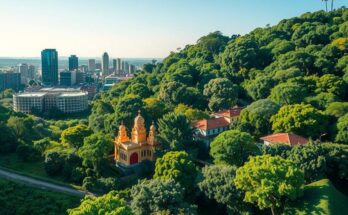The independence of South Sudan was meant to symbolize freedom; however, deep-rooted divisions and political mistrust have persisted. Recent clashes and military actions threaten the ongoing peace agreement between President Salva Kiir and Vice President Riek Machar, complicating efforts to stabilize the nation.
The independence of South Sudan in 2011 was envisioned as a new beginning, liberating the nation from previous oppressive policies of Arabization and Islamization under past Sudanese governments. However, significant divisions and political distrust continue to plague the country, undermining its stability.
Recent unrest has been triggered by clashes between an armed faction and government forces, leading to the arrest of a deputy army chief allied with Vice President Riek Machar. The government’s military actions, including surrounding Machar’s residence, have escalated tensions and jeopardize the fragile peace agreement.
According to AP News, South Sudan experienced a devastating civil war from 2013 to 2018, resulting in over 400,000 fatalities. A peace agreement was signed in 2018 between President Salva Kiir and Machar; however, its implementation is ongoing and requires significant progress.
Recent military confrontations have surfaced in Upper Nile State, particularly between the White Army, previously allied with Machar, and government forces. The BBC indicates that although the power-sharing agreement ended the fighting, critical elements such as a new constitution, elections, and the consolidation of armed factions into a unified military remain unaddressed.
In the midst of these challenges, President Kiir has urged South Sudanese citizens to remain calm and reassured them by stating, “I have said it time and again that our country will not go back to war. Let no one take law into their hands.” He emphasized the government’s commitment to managing the crisis and maintaining a path towards peace.
In summary, despite the optimistic onset of independence in South Sudan, ongoing political tensions and ethnic divisions continue to threaten the nation’s stability. The recent clashes and arrests signify a regression in the peace process initiated by the 2018 agreement. President Kiir’s call for calm and resolution underscores the importance of governmental responsibility in ensuring peace and order in South Sudan.
Original Source: moderntokyotimes.com




